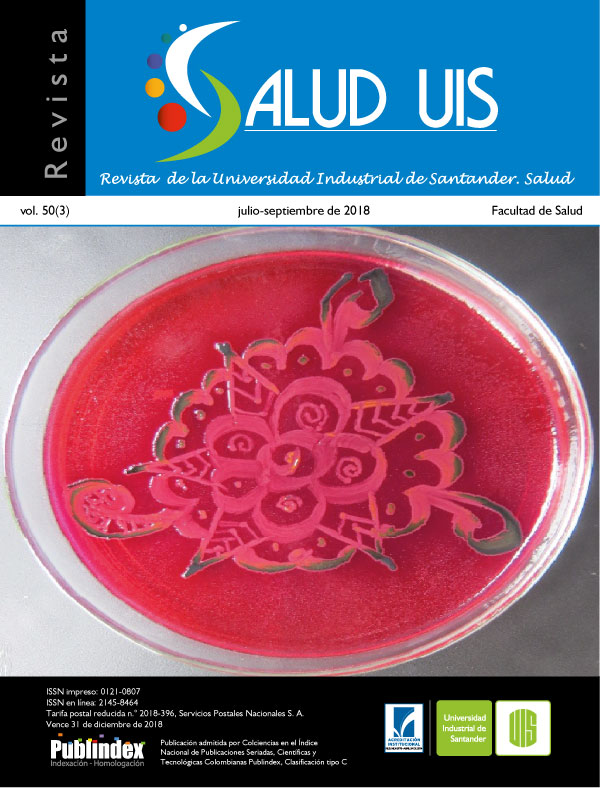Abstract
Objective: To determine the level of moral development of the students of the Nursing program of the Universidad Industrial de Santander. Materials and methods: Cross-sectional study using the Opinion Questionnaire on Social Problems (COPS) based on the classification proposed by Kohlberg and restructured by Rest. The target population corresponded to 187 nursing students from the Universidad Industrial de Santander, enrolled in the thematic nuclei of carefulness. Results: It was possible to establish the development of moral competence in each of its levels: pre-conventional, conventional and post conventional, evidencing a correspondence of 42.9% for conventional moral development, followed by 39.4% for the conventional post, and 9.5 % for the pre-conventional. Conclusions: The majority of nursing students were at the conventional level of their moral development, aspect that allows to infer that there are no differences between academic levels, except in the third level students, who obtained a greater post-conventional moral development, which can obey of the coincidence between the completion of the subject of ethics in nursing, contained in the curricular plan, and the time when the research was carried out.
References
2. Potter VR. Bioética puente, bioética global y bioética profunda. Cuadernos del Programa Regional de Bioética, OPS/OMS. 1997; 7: 32.
3. García G. Hacia un ethos sanitario. En bioética y justicia sanitaria. Colección Bios y Ethos N° 9. Bogotá: Ediciones El Bosque, 2ª Edición, 2001. p. 101.
4. Linde A. Síntesis y valoración de la teoría sobre el desarrollo moral de Lawrence Kohlberg. Ágora-Pap Filosofía. 2010; 29(2): 31-54.
5. Paravic K. Enfermería y globalización. Cienci Enferm. 2010; 16(1): 9-15. doi: 10.4067/S0717-95532010000100002.
6. Arbeláez R, Corredor M, Pérez M. Concepciones sobre competencias. Bucaramanga: Ed Universidad Industrial de Santander – CEDEDUIS; 2009.
7. Kohlberg L. De lo que es a lo que debe ser. Cómo cometer la falacia naturalista y vencerla en el estudio del desarrollo moral. Buenos Aires, Prometeo Libros; 2010.
8. Narváez D. Educación y desarrollo moral. Rep Polit Soc. 2003; 2(2): 39-49.
9. Rest JR. Development in judging moral issues. Estados Unidos, Ed. University of Minnesota Press; 1979.
10. Amaya I, Ibáñez L. Reforma curricular del programa de enfermería. Universidad Industrial de Santander. 2004. p. 19, 31.
11. Barba B, Romo JM. Desarrollo del juicio moral en la educación superior. Rev Mex Inv Ed. 2005; 10(24): 67-92.
12. Pérez I, Dussán M. Validación de la prueba Defining Issues Test con estudiantes de medicina en la Universidad del Rosario en Colombia. Rev Electr Inv. 2009;11(1): 1-13.
13. Céspedes S, Gonzáles A, Aguilar M, Cortés M. Desarrollo ético-moral en estudiantes de ciencias de la comunicación. Rev Cienc UANL. 2015; 75: 81-86.
14. Bužgová R, Sikorová L. Moral judgment competence of nursing students in the Czech Republic. Nurse Educ Today. 2013;33(10): 1201-1206. doi: 10.1016/j.nedt.2012.06.016.
15. Barba B. Razonamiento moral de principios en estudiantes de secundaria y de bachillerato. Rev Mex Inv Ed. 2001;6(13): 501-523.
16. Perry CM, McIntire WG. Modes of moral judgment among early adolescents. Adolescence. 1995; 30(119): 707-715.
17. Jaramillo M. Educación religiosa y desarrollo moral. [Tesis de maestría]. Pereira, Universidad Católica Popular del Risaralda; 2010.
18. Zerpa CE. Tres teorías del desarrollo del juicio moral: Kohlberg, Rest, Lind. Implicaciones para la formación moral. Laurus Rev Edu. 2007;13 (23): 137-157.
19. Moltó Brotons J, Pérez-Delgado E, Mestre Escrivá V. La variable sexo y su efecto en el desarrollo estructural y de contenido del racionamiento sociomoral. Recerca Rev Pensament Anàlisi. 1990;15(1-2): 91-115. doi: http://dx.doi.org/10.6035/Recerca.
20. Pérez E, García R, Clemente A. La capacidad de razonamiento moral en jóvenes adolescentes (13-19 años). Rev Edu. 1994; 303: 261-279.
21. Cueto S, Mueller D. Razonamiento moral en hombres y mujeres en cinco niveles educativos. Rev Psicol. 1990; 8(1): 11-20.
22. Gilligan C. In a Different Voice: Women’s Conceptions of Self and of Morality. Harvard Educational Review, 1977;47(4): 481-517. doi: /10.17763/haer.47.4.g6167429416hg5l0.
23. Rest J. Moral development: Advances in research and theory. New York, NY: Praeger; 1986.
24. Walker L. Sex differences in the development of moral reasoning. Child Development, Lafayette, 1984;53: 677-691. doi: 10.2307/1130121.
Se autoriza la reproducción total o parcial de la obra para fines educativos, siempre y cuando se cite la fuente.
Esta obra está bajo una Licencia Creative Commons Atribución 4.0 Pública Internacional.
